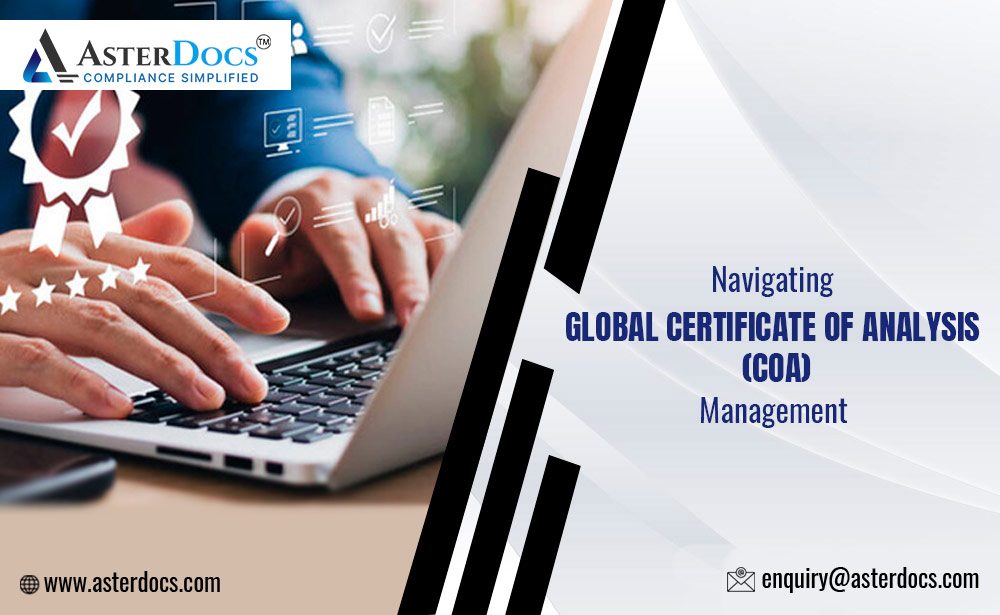A Certificate of Analysis (COA) is a crucial document created by manufacturers to certify that their produced goods align with the specified requirements of their customers.
It serves as a vital assurance for customers, ensuring that the received product meets the defined parameters and targets, precisely catering to their needs. Accurate COAs can prevent costly returns, replacements, or customer complaints.
In the intricate global landscape of Certificate of Analysis (COA) management, businesses face the challenge of complying with diverse regulations across different countries and jurisdictions.
This journey demands a nuanced understanding of international regulations and a commitment to best practices for global procurement.
Understanding a Certificate of Analysis Document
The creation of a Certificate of Analysis (COA) is subject to specific guidelines outlined by the Food and Drug Administration (FDA). These guidelines encompass the following essential components:
Supplier Information: This section incorporates details pertaining to the material supplier, encompassing their name, address, and additional contact information.
Materials Identification: Within this segment, the material undergoing verification is clearly identified through standard elements such as lot numbers, product codes, and descriptions.
Transportation Data: This area typically includes customer details, original purchase orders, and other relevant information related to the item’s destination.
Evidence of Conformance: Arguably the most critical section, it outlines specific characteristics, test results, or other evidence aligned with industry standards, regulatory requisites, or customer-specific requests.
In some instances, performance standards may also be indicated for reference.
Signature Data: The concluding section of the COA features a signature, affirming that the evidence presented underwent thorough review by a qualified and authorized product inspector.
Challenges in COA Management Across Borders
Effectively managing Certificates of Analysis (COAs) across different regions introduces a host of challenges that businesses must confront.
These challenges span various aspects, including language barriers, disparate quality standards, and diverse regulatory frameworks.
Language Barriers: Dealing with diverse languages in multiple regions may lead to misinterpretations.
Differing Quality Standards: Each region may adhere to distinct quality standards, requiring harmonization for uniform product quality.
Varied Regulatory Frameworks: Regulatory requirements for product specifications and safety standards can significantly vary. Adhering to diverse frameworks is crucial to avoid non-compliance issues.
Inconsistent Data Formats: Varying data presentation formats in different regions can create challenges in interpreting COA data accurately.
Timeliness and Accessibility: Timely availability and accessibility of COAs across borders are critical for supply chain processes and decision-making.
Adopting a Unified Approach to COA Management
To overcome these challenges, businesses must adopt a unified approach to COA management that transcends geographical boundaries. This involves:
Standardized Processes: Implementing standardized processes for COA creation, review, and distribution ensures consistency.
This includes adopting a common template, language standards, and quality benchmarks that are applicable across regions.
Technological Integration: Leveraging advanced Document Management Systems (DMS) and technologies, such as AsterDocs, can streamline Certificate Of Analysis management.
These platforms provide a centralized repository, ensuring uniformity in data storage, retrieval, and collaboration.
Training and Communication: Conducting training programs to educate personnel across regions on COA requirements and best practices fosters a shared understanding.
Clear and effective communication channels contribute to minimizing errors arising from misunderstandings.
Compliance Audits: Regular compliance audits help in evaluating adherence to standardized COA processes and identifying areas for improvement. This proactive approach ensures ongoing alignment with regulatory requirements.
By addressing these challenges head-on and adopting a unified approach supported by technology and standardized processes, businesses can enhance the efficiency and reliability of their cross-border COA management.
Streamlining Global COA Management
In the intricate landscape of global COA management, AsterDocs emerges as the game-changer, offering:
With AsterDocs as the linchpin, businesses navigate global Certificate of Analysis challenges seamlessly, achieving consistency, accuracy, and compliance across borders.














